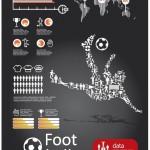It’s safe to say ‘Super Bowl Sunday’ has become a national holiday. As soon as the Christmas decorations are packed away and New Year’s resolutions broken, it’s time for January’s bright spot: the Super Bowl party.
Sports marketers, however, began planning for this year’s Super Bowl as soon as the Guy Lombardi trophy was awarded to last year’s winner. Super Bowl Sunday is a sports marketer’s dream, an excellent example of the symbiotic relationship between professional sports and marketing.
The Super Bowl Of Advertising
One relationship is obvious. After all, what do you think of when you hear the words “Super Bowl?” Commercials, right? Since January 15, 1967, the Super Bowl has grown to become one of the most-watched broadcasts in the U.S.; the 2010 match between the Indianapolis Colts and New Orleans Saints was the most-watched show in U.S. television history. Companies were quick to take advantage of this huge built-in audience and, for the last thirty years have used the Super Bowl to launch new products and showcase innovative ad campaigns. Creative sports marketers have made Super Bowl commercials themselves an event, discussed in the office, online, and in the media for several days after the game.
Occasionally, ads eclipse the game itself; few may remember who won Super Bowl XVIII, but millions remember Apple’s “1984” commercial, broadcast only once during the third quarter. Now, a thirty-second spot can bring in $3 million. And that’s $3 million well-spent. Experts find that not only do Super Bowl ads reach large numbers, they reach large numbers of people most likely to generate buzz about the featured brands–particularly cars, alcohol, financial services, and travel.
How Professional Football Benefits From Super Bowl Marketing
The NFL runs promotional ads during the game, and players are prominently featured. A winning Bowl performance can earn a player lucrative endorsements—which reflect positively on the team and the NFL. The Super Bowl brings thousands of fans to the hosting city, leading to hundreds of small-scale marketing campaigns, and exciting economic opportunities for the city itself. None of this is possible without advertising—one of the reasons why careers in sports marketing are individually fulfilling and economically valuable.
The Super Bowl is one example of how sports marketing jobs affect and influence public opinion, professional sports, and the economy. And if you were wondering—the Super Bowl XVIII winner? The Los Angeles Raiders.
###
Image by JanetandPhil





Really nice post!I liked the post very much.Thanks for sharing it with us.
Thanks
http://www.thetechmagnet.net/bose-sounddock-10.html